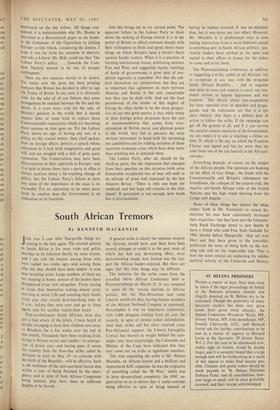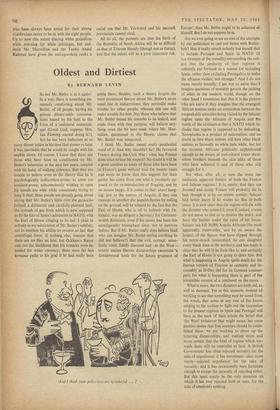South African Tremors
By KENNETH MACKENZIE
JusT over 1 year after Sharpeville things are coming to the boil again. The normal pattern in South Africa is for mass raids and police searches to be followed shortly by mass arrests, and I am told the tension among those who were raided two weeks ago—and among those who felt they should have been raided—is now near breaking point. Large numbers of them are not sleeping at home; several of the leaders have disappeared from view altogether. Those staying at home find themselves waking almost every morning at about 3.30 and watching their clocks creep past that crucial door-knocking time of 4 a.m., before they turn over and go to sleep again, safe for another twenty-four hours.
Non-revolutionary South Africans have also got a bad attack of the jitters. I have heard of people arranging to have their children sent away to Rhodesia for a few weeks over the end of this month. Thousands have been stocking food, laying in Primus stoves and candles—in anticipa- tion of power cuts—and buying guns. It seems the country feels the three-day strike called by Africans to start on May 29—to coincide with the birth of the Republic—will be effective. Such is the resilience of the anti-apartheid forces that within a year of being flattened by the emer- gency, and in spite of both African Congresses being banned, they have risen to sufficient heights to be feared. A general strike is clearly the supreme weapon the Africans should have, and there have been several attempts to wield it in the past, none of which has had any devastating effect, most demonstrating simply how limited was the sup- port the African leaders enjoyed. But there are signs that this time things may be different.
The initiative for the strike came from the so-called All-in African Conference held at Pietermaritzburg on March 25. It was intended to unite all the various factions in African politics, but the Pan-Africanists and some Liberals would not play, leaving former members of the African National Congress in command. Nevertheless it was an impressive conference, with 1,400 delegates coming from all over the country, in spite of intense police intimidation. And their strike call has since received some Pan-Africanist support; the Liberal fortnightly Contact has thrown its weight behind the cam- paign; and, most surprisingly, the Coloureds and Malays of the Cape have indicated that they may come out on strike in significant numbers.
The man organising the strike is Mr. Nelson Mandela, an African lawyer and a brilliant and experienced ANC organiser: he was the originator of something called the 'M Plan,' which was to have decentralised completely the ANC or- ganisation so as to ensure that it could continue being effective in spite of being banned or having its leaders arrested. It was an excellent plan, but it was never put into effect. However, Mr. Mandela is a professional who is now issuing instructions from a secret hide-out, which is something new in South African politics: pre- viously leaders have worked in the open and waited in their offices or homes for the police to come and arrest them.
The Pietermaritzburg conference, in addition to suggesting a strike, called on all Africans 'not to co-operate in any way with the proposed South African Republic . . . and to organise and unite in town and country to carry out con- sistent actions to oppose oppression and win freedom.' This phrase about non-cooperation has been repeated since in speeches and propa- ganda, and the indications are that it is not mere rhetoric, that there is a definite plan of action to follow the strike. If the campaign can get off the ground at all, and if it can survive the massive counter-measures of the Government, we can expect it to aim at reaching a climax on June 26, which is the day on which the Freedom Charter was signed and has for more than ten years been one of the top festivals in the Africans' calendar.
Everything depends, of course, on the temper of the African people. The optimists are banking on the effect of four things: the break with the Commonwealth and Britain's subsequent un- friendliness, the collapse of the treason trial, the massive anti-South African votes at the United Nations and the high winds blowing from the Congo and Angola.
None of these things has shaken the white voters' faith in Dr. Verwoerd—in recent by- elections his men have consistently increased their majorities—but they have sent the Johannes- burg Stock Exchange down to new depths (I have a friend who sold Free State Gedulds for 190s. shortly before Sharpeville: they are now 84s.) and they have given to the non-white politicians the sense of being both on the win- ning side and on the respectable side. That is how the more cynical are explaining the sudden political activity of the Coloureds and Malays, who have always been noted for their strong middle-class desire to be in with the right people. Up to now this meant sharing white prejudices while yearning for white privileges, but sud- denly Mr. Macmillan and the Tunku Abdul Rahman have given the anti-apartheid ranks a social ton that Dr. Verwoerd and his uncouth provincials cannot rival.
All in all, the portents are that the birth of the Republic of South Africa will be as difficult as that of Trisram Shandy (though not as funny), and that the infant will be a poor insurance risk.















































 Previous page
Previous page